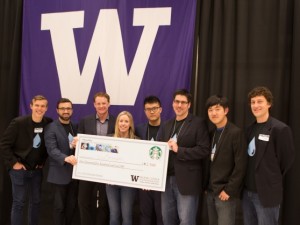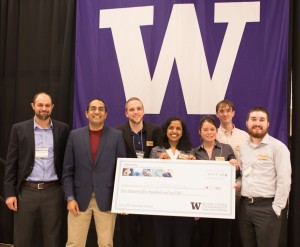Alaska Airlines Environmental Innovation Challenge awards $37,500 to student innovators
“Alaska Airlines wants to get better and better at being a leader in environmental responsibility, so today we’re here to learn from you,” said Joe Sprague, Alaska Airlines’ senior vice president for communications and external relations, in his welcome address at the 2015 Alaska Airlines Environmental Innovation Challenge.
The “you” he was speaking to was a group of 22 student teams from 7 colleges and universities across the state of Washington, gathered at the Seattle Center to pitch their innovations in clean technology, renewable energy and water resource management.
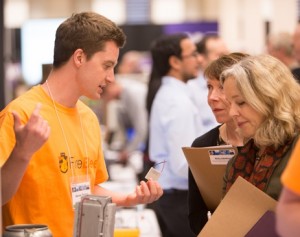 Throughout the afternoon these innovative and entrepreneurial students demonstrated their prototypes and fielded questions on everything from technology issues to market viability from a room full of 160+ judges and another 100 guests.
Throughout the afternoon these innovative and entrepreneurial students demonstrated their prototypes and fielded questions on everything from technology issues to market viability from a room full of 160+ judges and another 100 guests.
While all in attendance undoubtedly learned something from every team, only five teams went home with a portion of the $37,500 in prize money.
Congratulations to the winners of the 2015 Alaska Airlines Environmental Innovation Challenge!
$15,000 Grand Prize & $5,000 Clean Energy Prize
(sponsored by Wells Fargo and the UW Clean Energy Institute)
FireBee (University of Washington)
Student Team members:
Ryan Ahearn, undergraduate, mechanical engineering
Aaron Owen, undergraduate, mechanical engineering
Daniel Parrish, undergraduate, mechanical engineering
FireBee is a portable thermoelectric generator that turns cooking fires into personal power stations, creating an alternative energy source for people in countries that are otherwise off the grid.
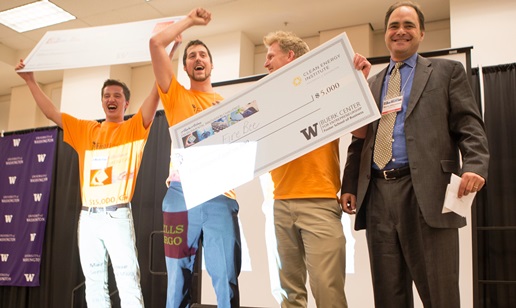
$10,000 Second Place Prize
(sponsored by the Herbert B. Jones Foundation)
Hook (University of Washington)
Student Team Members:
Rahil Jain, graduate, electrical engineering
Robert Moehle, graduate , Foster School of Business
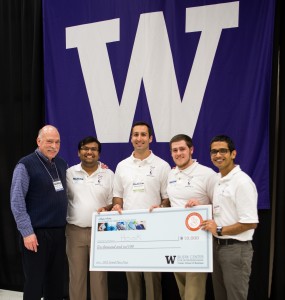
Hook is a home automation hub that allows customers to convert existing electronics to smart devices, decreasing energy consumption, improving home safety, and reducing the amount of electronics that are routinely discarded in landfills.
$2,500 Honorable Mentions
(sponsored by Starbucks, UW CoMotion, and Puget Sound Energy)
EcoStream (University of Washington)
Student Team Members:
Michaela Byrne, graduate, Foster School of Business
Tianchi Liu, undergradaute, computer science & engineering
Ryan Osher, graduate, Foster School of Business
Shon Schmidt, graduate, bioengineering
Wenxuan Wu, undergraduate, electrical engineering
Han Ye, undergraduate, electrical engineering
EcoStream builds awareness and lifelong habits to conserve our most valuable resource by helping people conserve water and change their usage habits in a fun and inexpensive way.
Ion Informatics (University of Washington)
Student Team Members:
Charles Daitch, graduate, Foster School of Business
Brendan Erickson, undergraduate, chemical engineering
Daniel Gilbert, undergraduate, chemical engineering
Matthew Murbach, graduate, chemical engineering
Uttara Sahaym, graduate, Foster School of Business
Arianna Whitten, undergraduate, chemical engineering
Ion Informatics is developing a proprietary technology that provides critical information to battery operators, optimizing asset utilization and prolonging the useful life of the battery. The end effect is a dramatic increase in value that can be extracted from each battery by enabling viable second use battery systems.
Bettery (University of Washington Tacoma)
Student Team Members:
Brendan Crawford, undergraduate, computer engineering
Chris Dejarlais, undergraduate, finance & computer science
Vishaal Diwan, undergraduate, computer science
Bettery provides a better model for battery use: a reusable subscription service that gives consumers unlimited access to reusable batteries with a monthly subscription.
The Alaska Airlines Environmental Innovation Challenge is presented by the Buerk Center for Entrepreneurship at the Foster School of Business, University of Washington.

